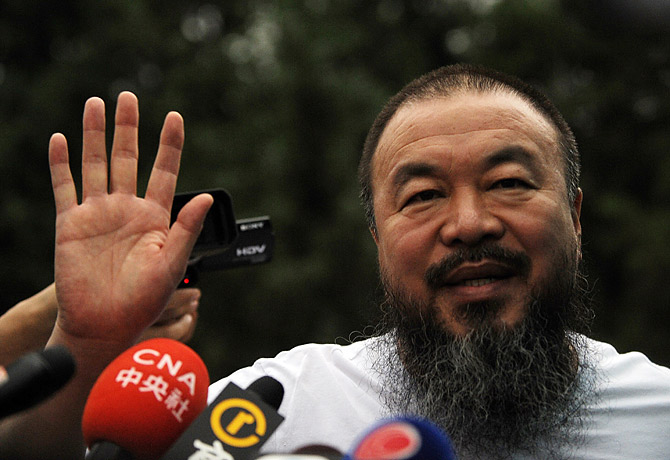
Chinese artist Ai Weiwei waving to reporters outside his studio in Beijing on June 23, 2011. (Photo: Peter Parks / AFP / Getty Images)
Chinese dissident and artist Ai Weiwei spent his 81 days of detention in a 12′ by 24′ room, watched at all times by two military police who were never more than few feet away from him and was required to ask permission before moving, even to scratch his ear. While the artist, who is accused of evading taxes, did not suffer physical abuse, the intense scrutiny took a toll, said a source with knowledge of the conditions of Ai’s detention. “The conditions were extremely tough,” said the source, who asked not to be identified because of the sensitivity of Ai’s situation. “It was psychological abuse. It was mental abuse.”
Ai has been largely silent since he was released in June, saying that the terms of his release limit his ability to speak publicly or write online. Earlier this week the English-language edition of the Global Times, a Communist Party-run tabloid, published the first interview with Ai since his release. (Reuters and the Washington Post have previously reported on the conditions of Ai’s detention.) Last weekend Ai returned to Twitter, which is blocked in China but can be accessed through technical workarounds. In recent tweets he has raised the cases of two Chinese activists, Ran Yunfei and Wang Lihong, and discussed the ordeals of four friends and colleagues who were detained in connection with his case.
Ai helped design the Bird’s Nest stadium that was the centerpiece of the 2008 Olympics and last fall installed 100 million sunflower seeds at the Tate Modern’s Turbine Hall in London, has been a prominent government critic in recent years, raising questions about single-party rule and corruption, particularly after the 2008 Sichuan earthquake. He was stopped by police at the Beijing airport on April 3 for what state media later said was an investigation into “economic crimes.” The government now says that a company that handles Ai’s artistic productions owes close to $2 million in taxes and penalties, charges that he is contesting in court. The Global Times’ recent interview quoted several experts who emphasized that Ai’s case was not political and merely standard enforcement of the country’s tax laws. But during his detention Ai was told that he was under investigation for “inciting subversion of state power,” a charge that has been used to convict some of the government’s most vocal critics including Nobel laureate Liu Xiaobo, who is currently serving a 10-year prison sentence. “We won’t tolerate anyone who attacks the government,” an investigator told Ai, according to the source. The investigator said that the law would offer Ai no protection, noting that Liu Shaoqi, a former Chinese leader who fell from favor and died in prison during the Cultural Revolution, “died while holding the Chinese constitution in his hands, and we are not far from that era today.”
During his detention Ai was interrogated at least 50 times, the source said. He was not allowed to leave the room, which had one window that was covered, preventing any view outside. The 54-year-old artist was allowed to walk in his room, and paced back and forth over a distance of about 10 feet, all the time while being monitored by two guards who walked with him. Under the terms of his release Ai is restricted to Beijing for one year, though he is allowed to move freely within the city. He has accepted an offer to serve as a visiting lecturer at the Berlin University of the Arts, though he likely won’t be allowed to leave China to take up the post until next year.

